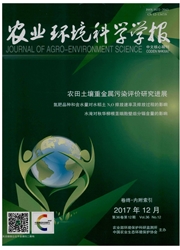

 中文摘要:
中文摘要:
以水稻(Oryzasativa L.)为材料,研究了不同浓度Cd对根尖细胞的遗传损伤作用。结果表明,随着Cd浓度增加和处理时间延长,水稻幼苗根尖细胞有丝分裂指数明显降低;4个时期相比,Cd对中期的影响最小。微核率随着Cd胁迫浓度的增加和时间的延长而增加,但浓度过高时,微核率反而有所降低;此外,Cd能诱发根尖细胞染色体畸变,染色体畸变率随着Cd处理浓度的增加和处理时间的延长而升高,呈现明显的剂量-效应和时间-效应关系。以上结果表明,Cd可引起水稻根尖细胞有丝分裂抑制和染色体损伤,具有明显的遗传毒性。
 英文摘要:
英文摘要:
Cadmium (Cd)is one of the most toxic pollutants in the soil, which can limit plant growth and crop productivity. In order to explore the cytogenetic damage induced by cadmium on rice (Oryza sativa L. )root tips cells, the root tips were treated with different concentrations of cadmium for 24 h, 48 h and 72 h, and the mitosis index, cell cycle, the frequency of micronucleus and chromosomal aberrations were determined. The results showed the mitotic index in root tip cells of rice seedlings were significantly decreased with the increase of Cd concentrations and treatment duration. Cadmium had the least effects on the metaphase cell ratios among four phases during the mitosis. The frequencies of micronucleus increased with the increase of Cd concentrations and treatment duration; However, beyond concentration of 75 μmol· L^-1, cadmium restrained the frequencies of micronucleus. Moreover, high frequencies of chromosomal aberrations of root tip cells in rice seedlings were produced by Cd, and the chromosomal aberration frequencies were increased in treated time-response and dose-response manners. The results of the present study indicated that cadmium could inhibit the mitosis and damage the chromosomes of root meristematic cells of rice seedlings, suggesting that cadmium had clear cytogenetic toxic effects on plant cells.
 同期刊论文项目
同期刊论文项目
 同项目期刊论文
同项目期刊论文
 A Novel Compound Enniatin G from the Mangrove Fungus Halosarpheia sp. (strain #732) from the South C
A Novel Compound Enniatin G from the Mangrove Fungus Halosarpheia sp. (strain #732) from the South C A novel N-cinnamoylcyclopeptide containing an allenic ether from the fungus Xylaria sp. (strain #250
A novel N-cinnamoylcyclopeptide containing an allenic ether from the fungus Xylaria sp. (strain #250 期刊信息
期刊信息
